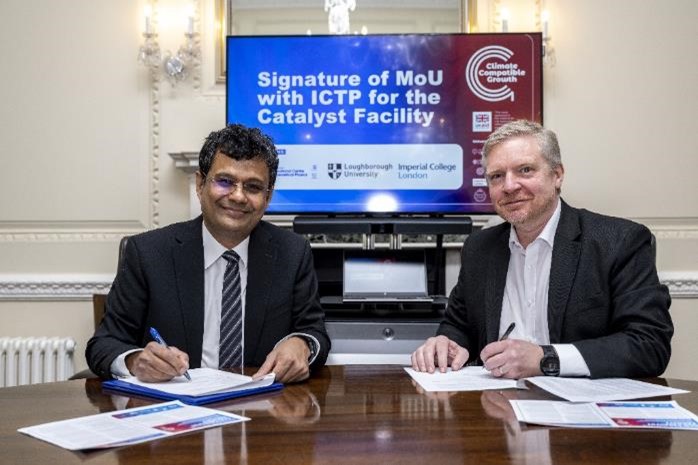NEW PARTNERSHIP AIMS TO SECURE LEGACY OF CLIMATE EXPERTISE IN THE GLOBAL SOUTH
Two highly respected organisations in the Climate Change sector officially joined forces last week to help countries in the Global South develop ‘home-grown’ specialists for the future. CCG (Climate Compatible Growth), and Trieste-based ICTP (the Abdus Salam International Centre for Theoretical Physics) – a UNESCO Category 1 institute – signed a Memorandum of Understanding, at a ceremony that took place on 30 January at Imperial College London.

Dr Atish Dabholkar, Director of ICTP (left) and Prof Mark Howells, Director of CCG sign the Memorandum of Understanding to launch the Catalyst Facility.
According to this agreement, ICTP will administer the Catalyst Facility that CCG has created as a financing mechanism to support the establishment of MSc climate transition programmes at universities in the Global South. The Facility will also underpin this by supporting research capabilities there. The Catalyst Facility provides a mechanism for other partners, including philanthropic foundations, to contribute financially to these strategic capacity building efforts.
Dr Atish Dabholkar, who signed the document as Director of ICTP, commented: “The ICTP’s fundamental mission is to create high-level science globally, so that all countries can engage themselves in decision-making. Science challenges in climate policy are complex so we need scientists from a broad range of countries to be trained and to be part of the discussion. Just a small investment in capacity building can improve the evidence base for climate action as well as the agency of people that help develop that evidence base. Our experience shows that relatively small investments in early-stage students, by running MSc programmes or similar, can yield considerable benefits over time.”
Prof Mark Howells of Imperial College London and Loughborough University signed the Memorandum of Understanding in his role as Programme Director of CCG which is an FCDO-funded programme. He explained: “One of CCG’s key aims is to empower analysts from the South so that they can drive the agenda that they are engaged with. The Catalyst Facility will take our collaboration with ICTP to another level, enabling countries in the Global South to embed their own expertise in energy modelling and analysis, and sustain this into the future.”
The Catalyst Facility will be open for financial contributions from April 2024 and discussions are already underway with several interested universities, including the University of Cape Town, which was represented at the ceremony by Dr Andrew Marquard. He commented: “This MOU is an important step forward, not only for South Africa, but for the rest of the continent where there’s very little climate analysis or modelling capacity. Developing countries, almost without exception, have significant policy challenges so the capacity building programmes that CCG and its partners have been developing, are vital.”